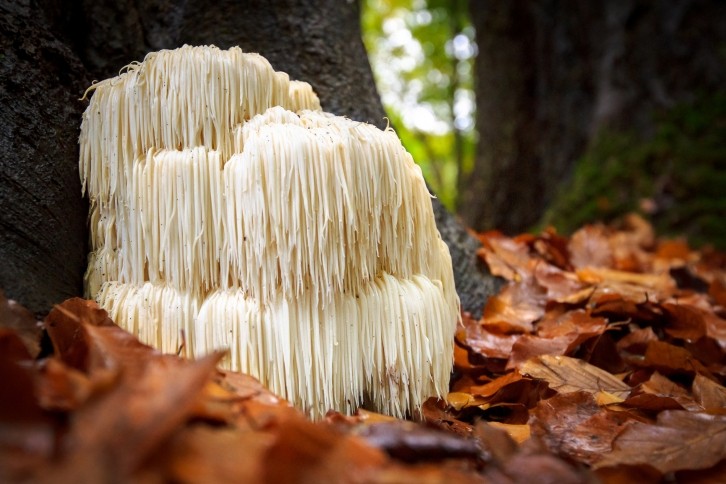Lion's mane spores 450% Google search growth

The program, now in its third series, follows British celebrity car expert and presenter Jeremy Clarkson in his obstacle-laden attempt to become a successful rural farmer.
In a recent episode, first streamed in May, Clarkson cultivates hordes of lion's mane in his makeshift underground facility, and his wife suggests dehydrating and blending them into powder to sell as supplements.
She informs him: “I put it in my coffee every morning, and it’s like spearmint going through my whole head, your whole mind opens up and you’re really clear thinking and the mornings I don’t take it I really notices—it’s amazing!”
“Everyone who’s anyone takes lion's mane,” she adds.
While they fail to make a powder that can pass health and safety regulations, they surely created awareness of the fungi after the show gained more than five million views, breaking Amazon Prime Video's UK ratings.
Online pharmacy Landys Chemist noted an immediate uptick in Google search activity following the upload of the episode to the streaming platform. It noted that during the week of May 21 to 28, Google Trends showed search volumes for the phrase 'lion's mane mushroom powder' increased by 450%.
And in the following week, Google searches for "benefits of lion's mane" increased by a further 120% while "what does lion's mane do" rose by 200%.
Luke O'Reily, CEO at the UK-based nootropic supplement brand Ten Percent Club, also noted the surge, attributing it to both the TV program and biohacking influencers on TikTok.
"We've noticed a significant increase in interest in lion's mane mushroom recently, especially after its exposure on platforms like Clarkson’s Farm and TikTok. Traditionally, athletes have been early adopters of this mushroom for its cognitive and health benefits. It's encouraging to see that the broader public is now also recognizing its value."
The shrooming trend
Suppliers and brands throughout Europe have noticed this mushroom climb its way up in consumer perception.
“Lion's mane is a very trendy mushroom,” Robin Gurney, founder of Musheez, the Estonia-based organic mushroom supplement supplier, told NutraIngredients. “It’s up there with cordyceps as the two seen to be performance enhancers. Gymgoers buy into cordyceps for strength and endurance, and biohackers buy into lion’s mane for memory, cognition and focus.”
His firm, which supplies brands in countries across the continent, has witnessed 100% growth year on year for the last few years, but he has noted a distinct uptick in awareness in the last 12 months alone.
“It used to be that we were contacting brands and telling them about mushrooms and asking if these could be incorporated into their portfolio. Whereas now, brands are coming to us already knowing the benefits and wanting to add these to their range,” he added.
“I do think lion's mane is on the tip of everyone’s tongue," said Sophie Barrett, an independent medical herbalist and consultant for mushroom supplement brand Hifas de Terra. "It has taken off for us. Reishi used to be the number one best seller, and now it's concentrated extract of lion's mane.”
Barrett runs her own naturopathic clinic and hosts education sessions with health professionals for Hifas de Terra. She has witnessed the change in focus of these discussions as the fungi are taken increasingly seriously, not only by gen Zers and millennials but as a serious solution for health aging.
“It’s not just for young people who want to take it for their exams, but it’s for the elderly and those looking at preventative health solutions,” she said. “It’s something we’ve noticed at my clinic also. While we used to have a lot of mainly young females and a lot of people with autoimmune diseases, now we have more elderly patients.”
She added that there has been more interest coming from health practitioners beyond nutritionists, dietitians, herbalists and kinesiologists, with doctors and general practitioners starting to ask questions about how these ingredients can support their patients.
"It's great that they can see the benefits of adding these products to their patient care toolbox," she said.
Rhysa Phommachanh, head of digital at Landys Chemist, outlines the benefits of lion’s mane:
Cognitive Function
Lion’s mane mushrooms contain compounds such as hericenones and erinacines, which stimulate nerve growth factor production and, in turn, support brain health, memory and focus.
Research indicates it may have neuroprotective properties due to its ability to promote nerve growth and repair, which could potentially aid in the prevention or management of neurological conditions such as Alzheimer’s, dementia and Parkinson’s disease.
Mental Health support
Evidence suggests that consuming lion's mane mushrooms can help alleviate symptoms of stress, low mood and anxiety due to their anti-inflammatory properties. This mushroom also supports the production of nerve growth factor (NGF), which may help regulate mood and promote overall mental well-being.
Immune System Boost
The fungi contains polysaccharides, specifically beta-glucans—compounds that can help enhance the immune system.
Anti-inflammatory and antioxidant properties
Rich in antioxidant and anti-inflammatory compounds, these mushrooms can help reduce oxidative stress and inflammation.
Digestive health
Lion’s mane can promote the growth of beneficial gut bacteria and reduce inflammation in the gut lining. This can potentially aid with conditions like ulcers and inflammatory bowel syndrome.
Menopausal symptom relief
Preliminary research has indicated that supplementing lion’s mane mushrooms could provide symptomatic relief for women going through menopause, such as sleep disturbance and mood swings. This is potentially due to its beneficial effect on NGFs and cognitive enhancement.







